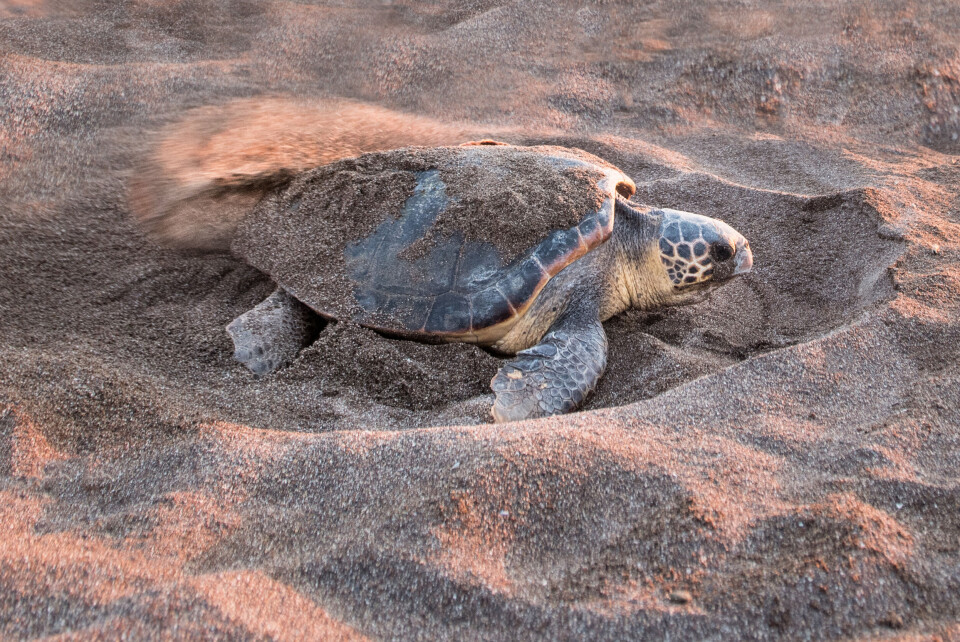-
La Voie Bleue: European Cycle Route of the Year is in France
700km bike path linking Luxembourg and Lyon has been crowned winner of the 2026 title
-
MAP: See how your location in France affects online food shop prices
New analysis shows how your shop compares on average
-
Further sightings of processionary caterpillars in France prompt action from local authorities
Caterpillars have arrived early after mild winter
Turtle lays 100 eggs on beach in southern France, tourists kept away
Authorities have set up an exclusion zone around the nest to ensure that the eggs develop. Turtle nests are becoming more common in France due to climate change

A loggerhead turtle has laid around 100 eggs on a beach in Hérault, southern France, prompting authorities to take action to ensure the area is protected from the many tourists that visit in the summer.
A passer-by alerted firefighters to the event at 12:30am on Sunday (July 17) on the Valras beach (Hérault, Occitanie), causing local services to step in.
Cindy Capdet, manager at Mediterranean sea turtle care centre CESTMed, said: “We have asked the mairie to not allow [firefighter] engines [or other vehicles] on the beach, so as not to cause vibrations in the nest, which would interrupt the development of the egg.”
Olivier Sébastien, director of technical services at Valras beach, told BFMTV: “This is an urban beach. We have created a perimeter 50 metres around the nest, and banned people from going in. For two months, there will be no access to this area of the beach, for all services, including emergency personnel.”
This is because the incubation period for loggerhead turtle eggs is two months.
#Atypique|| Cette nuit les #SapeursPompiers de l’#Hérault ont été alertés🚨pour une tortue qui pondait sur la plage de @Valras_Plage Aussitôt sur place ils ont mis en œuvre un balisage de protection avec les services techniques de la commune #Happy pic.twitter.com/mCF0kFSObn
— Pompiers 34 🇫🇷 (@PompiersHerault) July 17, 2022
A surveillance camera has been installed in front of the nest to keep watch, and the temperature is also being monitored, as it should remain between 24-34C degrees under the sand, the experts have said.
“If the nights become too cold, we plan to move the nest,” said Ms Capdet.
An increasingly common occurrence
While this is the first time that a turtle has laid eggs in this particular spot, they are not unheard of on the beach in general.
Ms Capdet said: “It’s the first time we’ve found a nest at this spot, but that doesn’t mean that turtles, which are common in the Mediterranean, never come here.
“The turtle was probably born on this same beach 20 or 30 years ago, because turtles come to lay eggs where they were born.
“What is rare is being present for the laying and to be able to protect the nest. If no one had been passing the spot at that exact moment, the turtle would have left without anyone realising that there was a nest under the sand.”
The loggerhead is a protected species, and is often found in the Mediterranean. Also called Caretta caretta (its scientific name), it can grow up to a metre in length and weigh 70-170kg. It is more common for it to lay eggs in the central-east Mediterranean, including Greece, Tunisia, or Italy.
Yet, the French marine turtle monitoring group l'Observatoire des tortues marines de France has reported a rise in reproductive activity of the species in the country in recent years. This is likely linked to rising Mediterranean surface temperatures due to climate change.
In 2018, more than 60 baby loggerhead turtles hatched on another Hérault beach, and were only noticed by a passerby when they saw a baby turtle on the sand.
Specialists arrived on the beach soon after to inspect the nests, and opened a small channel in the sand to allow the babies to get back to the water as quickly as possible (turtles typically hatch high up on a beach and then run down to the sea).
Four baby turtles were taken for extra care as they appeared especially weak, of the 63 counted in total.
In 2020, another hatching was seen on the Sablettes beach in Fréjus (Var, Provence-Alpes-Côte d'Azur).
Any sighting of sea turtles laying eggs on a beach in France should be reported to the Réseau tortues Marines de Méditerranée Française at 06 64 79 54 23, or to the local pompiers and mairie as soon as possible.
Related articles
VIDEO: Turtles hatch and fight way to sea on French beach
























